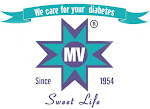New Year Resolutions for people with Diabetes
The New Year is a time to make promises to take care of yourself so that you have a better tomorrow. This year set goals to enhance your diabetes management and overall health. Your goals should be precise, not vague, assessable, measurable, true-to-life and should not take an indefinite time to achieve.

The New Year is a time to make promises to take care of yourself so that you have a better tomorrow. This year set goals to enhance your diabetes management and overall health. Your goals should be precise, not vague, assessable, measurable, true-to-life and should not take an indefinite time to achieve.
- Visit your diabetologist, podiatrist and dietitian regularly.
- Follow your schedule for checking blood glucose levels.
- Follow exact instructions for every diabetes medication you take.
- Be aware of your A1C, blood pressure and cholesterol levels and keep them under control.

- Be active.
- Follow a well-balanced meal plan that is low in fat, concentrated sugars, and refined carbohydrates such as white bread and white rice and salt. Including high fibre foods, such as oats, whole grains, fruits and vegetables will not only help reduce cholesterol, but also stabilize blood sugar level. Include proteins such as lean meats, seafood, low-fat dairy and plenty of water to your diet and stay away from alcohol.
- Don’t smoke.
- Monitor your blood pressure, blood cholesterol and kidney function regularly.
- Get your eyes and feet examined routinely.
- If you have symptoms such as fatigue, unexplained weight loss, excessive thirst, urination or hunger, anxiety, blurred vision, frequent infections or have wounds that are slow to heal, go to your doctor immediately.
- Be familiar with the warning signs of high or low blood sugar and be prepared to counter it.
- Keep yourself up-to-date about advancements in the treatment of diabetes. For example, research has shown that getting 7 to 8 hours sleep every night can reduce the risk of diabetes, and that a person who smokes more than 20 cigarettes per day increases their risk of diabetes by almost half. Medications are always being reviewed.
- Know your target glucose levels and monitor blood glucose regularly every day even if you have no symptoms.
- Take all your medications regularly.In addition to insulin or oral medications, a diabetic person may need other medicines, such as those necessary to control or regulate cholesterol or blood pressure.
- Examine your feet for cuts and sores.
- Brush and floss your teeth.
- Control your weight and diabetes symptoms with exercise. There is a direct correlation between obesity, insulin levels, and diabetes… as well as many other diseases. So stay active, exercise and maintain a normal body weight.
Although diabetes is a life- long disease, following your New Year resolutions will helpreduce the risk of complications and make you feel good all through the year.
































